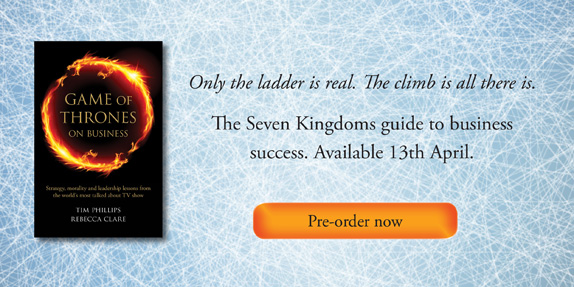Why Game of Thrones is better than PowerPoint
9 June 2014 by Rebecca in Business and finance, Entertainment, Game of Thrones on Business
If you’ve never watched Game of Thrones, you may be missing out on more than mere entertainment. Maybe it’s because you don’t really like stuff about wizards and orcs. Don’t worry: no wizards or orcs in Game of Thrones. Granted there are a couple of dragons, although they aren’t in it much. But that’s not the point. Regardless of your feelings on dragons, with Game of Thrones, as with so much in life, you stay for the stories.

First off – I totally get it. When I was at school, the geeky kids used to play a board game called Dungeons and Dragons, which was like computer games would be if no one had invented electricity. I sat in once, and it confirmed my wish to stamp on the dungeonmaster’s glasses after everyone else went home.
Fast forward 30 years, and I’m glued to Game of Thrones every week. Is this because I’ve successfully dealt with my anger issues, or are the dragons just better these days?
Clearly I’m more tolerant of things that couldn’t ever really happen but are fun to think about, having had my mind unexpectedly expanded by authors such as Alan Moore and Peter Ackroyd. And Game of Thrones isn’t short of mind expanding situations. There are seven kingdoms full of people cheating, fighting, having sex, fighting the people they just had sex with, cutting off those people’s heads, cheating some more, fighting the people who still have heads who are angry because they got cheated, … you get the hang of it. Sometimes the writers bump off the most important character, just to make us go WHAT?
Game of Thrones gets confusing the moment you stop concentrating or nip out to make a sandwich, but I rather enjoy that bit. I am constantly thinking, ‘Hang on, I thought he had been tortured to death in the local brothel last week’ or ‘Is that woman he’s having sex with his cousin or his great aunt?’ These thoughts remind me, perhaps somewhat alarmingly, of an adolescence spent in Odin’s discotheque in Driffield. That was the 1980s, kids. In many ways Game of Thrones recalls that era: a tendency to big hair and shoulder pads, no mobile phones, Charles Dance.
But I digress; trying to make sense of little mysteries should be one of the great pleasures of our adult lives. It is literally what makes us human. As the biologist William Calvin explains in a 2006 paper on ‘The emergence of intelligence’:
Our abilities to plan gradually develop from childhood narratives and are a major foundation for ethical choices, as we imagine a course of action, imagine its effects on others and decide whether or not to do it.
In Odin’s, as in Game of Thrones, most of the time the response was, ‘Let’s do it, what’s the worst that could happen?’
So, we do not learn by being told, but by doing and observing, and working out what happens next. We learn by creating a story out of experience. But, when we grow up and go to University and then get an office job, what does the world give us to make sense of life?
PowerPoint, that’s what.
PowerPoint is anti-story. We go into a room. Someone reads out 30 slides which all seem to be lists. Sometimes the lists magically appear, point by tedious point: as suspenseful as watching a tap drip. Sometimes the lists have little sublists, which have their own titchy sub-sublists. The titchy lists are in italics. No one tells you why. Sometimes there will be important diagrams which pretend they tell a story, but MAKE NO SENSE.
A proper story has what Chris Anderson, the man who created TED talks (and therefore a man who knows about storytelling) calls the ‘aha moment’: the pleasure when we work something out for ourselves, when we realise something without someone telling us it. The fog lifts.
Jokes have this structure, conversation has it, sport has it, walking into a bar and choosing a beer has it, even shopping on Amazon has it. Game of Thrones has it in seven kingdoms, all at once. Presentations do not, because the people who write them don’t bother to put it in. You’ll learn far more about your co-workers from Game of Thrones than you will from a dozen teambuilding seminars.
Being confused for a while is fun, because it’s more satisfying. Presentations are worse than real life, because they take out the stories, the bits that help us work it out for ourselves. If you present to me and there’s no aha moment, you know what I will be thinking: I’d like to stamp on that presenter’s glasses. And if that sounds like negative feedback, it’s better than what happens to most of the characters in Game of Thrones.
You might also like: What Game of Thrones tells us about corporate inbreeding; What Machiavelli knew and Robb Stark found out.

